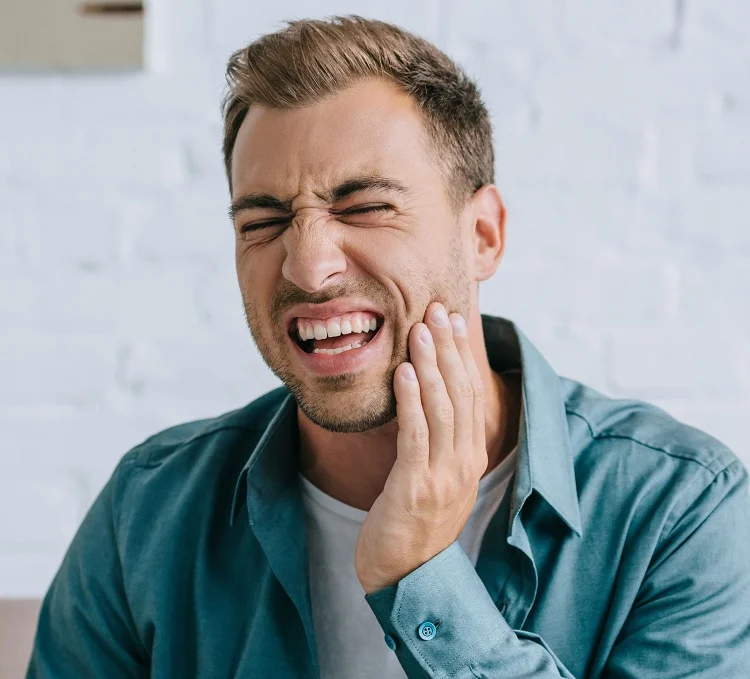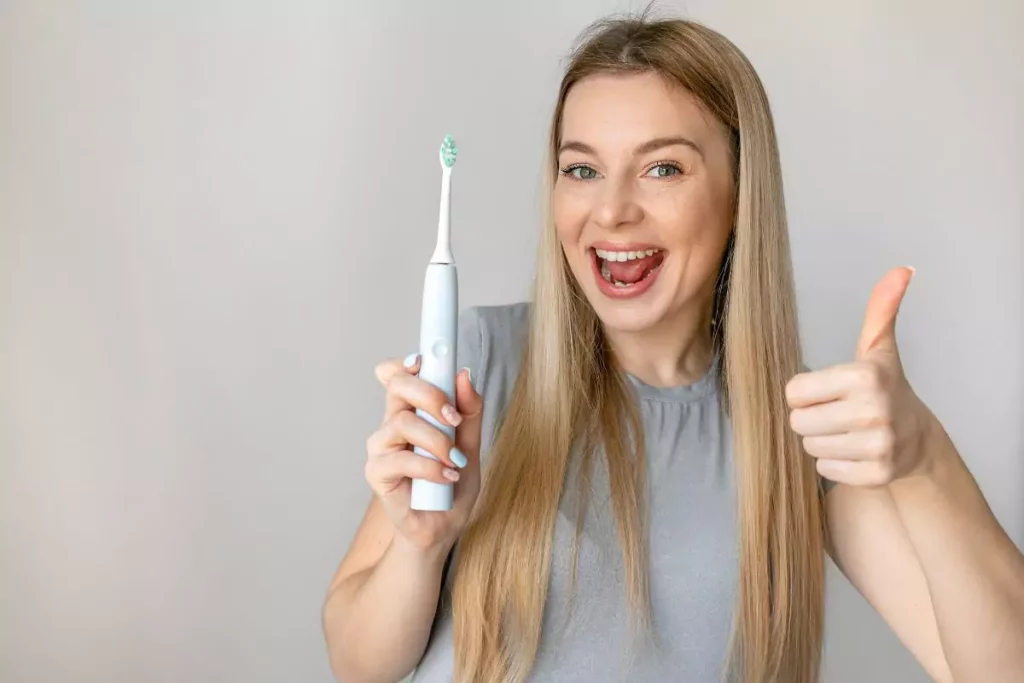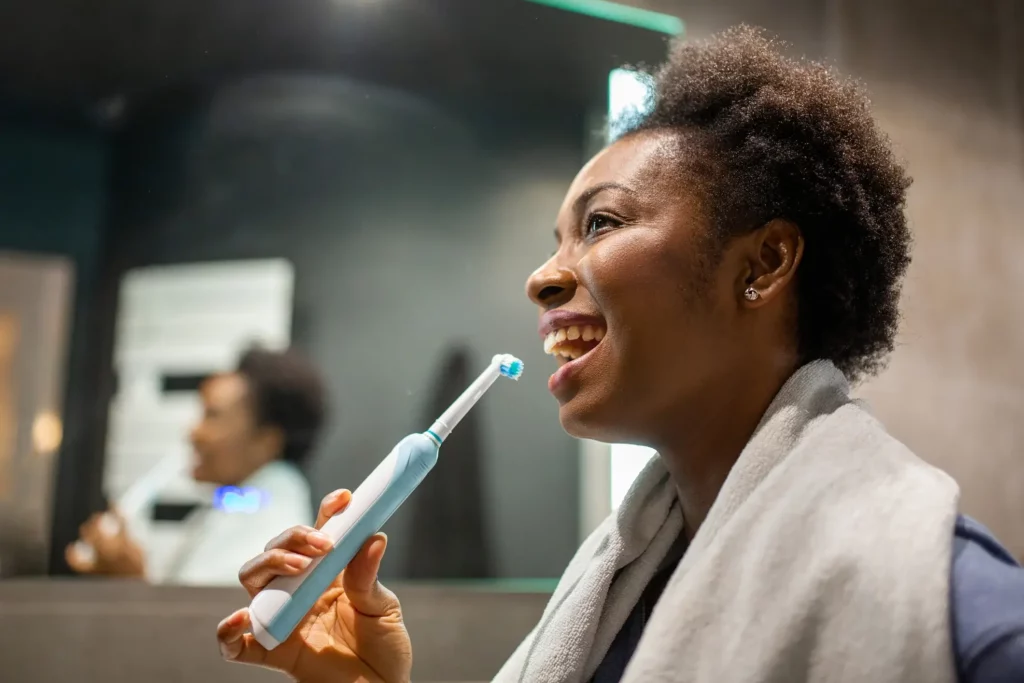Can tooth pain cause chest pain? The answer is in this article. Also, their causes and treatments are explained.
When pain occurs, it is usually attributed to changes in the affected or a nearby area. Associating tooth pain and chest pain may seem strange. However, although rare, it is possible that dental problems can cause chest pain and conversely, heart conditions trigger dental or jaw pain.
What are the Causes of Tooth Pain?
Tooth pain can have many different causes. The most common include:
• caries
• gum disease (gingivitis or periodontitis)
• dental abscesses
• trauma
• bruxism
Generally, when the pain has a dental origin, it disappears once the cause is eliminated. However, although it is not frequent, tooth pain can also be a symptom of more serious diseases, such as a heart condition. We also have complete information about the essential oils for toothache to help you treat or reduce the pain in your home.
What are the Causes of Chest Pain?
Although chest pain is often associated with a heart attack, it can also be caused by other problems:
• Angina
• Panic attacks
• Muscular tension
• Infections, such as bacterial endocarditis or mediastinitis
• Lung diseases such as pneumonia, pleurisy, or pulmonary embolism
• Costochondritis: an inflammation of the cartilage that joins the ribs to the breastbone.
• Heartburn or diseases of the esophagus
How does a Toothache Cause Chest Pain?
Alterations in dental health can cause chest pain in several ways:
1. Pain generates stress
Tooth pain and anxiety during dental care can trigger a stress response in the body, which can lead to a constriction of blood vessels, thereby causing chest pain.
2. Fear causes hyperventilation
Stress and fear can also cause rapid breathing, known as hyperventilation. This is more common in young adults. It can cause chest pain, even if it’s not related to heart disease.
3. Infections and tooth abscesses can cause mediastinitis
When dental infections or abscesses are not treated in time, they can spread to other parts of the body. Mediastinitis is a condition in which the area located between the lungs and the heart becomes inflamed, as a result of an infection.
People with mediastinitis may experience chest pain, accompanied by shortness of breath, fever, or chills. Patients with untreated advanced dental infections are at risk for this life-threatening condition, requiring immediate medical and dental attention. Also, we have a comprehensive guide about draining tooth abscess at home.
4. Bacteria in the mouth can cause bacterial endocarditis
When bacteria from the mouth enter the bloodstream, they can stick to the lining of the heart, heart valves, or blood vessels. This condition is known as bacterial endocarditis. This condition can obstruct blood flow and oxygen distribution, impeding the proper functioning of the heart. This pathology is rare, but it occurs more easily in people who have had heart conditions in the past. Requires emergency medical attention.
Can Tooth Pain Cause Chest Pain?
A study showed that 1 out of 15 patients who presented with heart attacks felt some type of pain in the craniofacial area. The nerves that control dental and chest pain are located in close proximity, so during an episode of heart disease, pain can be felt in both areas at the same time.
What are the characteristics of tooth pain of cardiac origin?
• Most of the time, it is a bilateral pain.
• Pain can also be felt in other craniofacial structures, as well as in the arms, shoulders, and thorax.
• It is usually accompanied by sweating, vomiting, and dizziness, but it can also appear as the only symptom prior to a heart attack.
• Although it can be severe, most patients describe it as less intense than tooth pain.
When tooth pain has a cardiac origin, patients consult a dentist for pain in the jaw area; during the dental examination, it is not always possible to detect the cause of the pain. In these cases, the dentist might suspect a heart condition and refer the case to an emergency medical service.
How to Prevent Dental Health from Causing Chest Pain?
1. Treat dental conditions as soon as possible
Patients with tooth pain or abscesses should receive treatment as soon as possible. It is important to remember that no infection of dental origin is cured by itself; it is always necessary to eliminate the cause of the infection, which may involve root canal treatments, abscess drainage, and even tooth extraction.
2. Maintain good oral hygiene
Several studies have revealed that people with gum disease are at a higher risk of heart conditions. Brushing your teeth three times a day, flossing daily, and visiting your dentist regularly are important steps in maintaining good dental and gum health.
3. Managing stress during dental care
In many cases, the application of aromatherapy techniques, music therapy, or psychological assistance can help reduce stress during a dental consultation. It prevents hyperventilation and reduces stress, thus avoiding chest pain.
4. Inform the dentist if you have been diagnosed with heart disease
Preventive measures are applied during the dental consultation to avoid cardiac complications in patients:
• With prosthetic valve carriers
• With a history of heart attack
• With heart transplants
• With congenital heart disease
Additional Tips
Remember that the body is
interconnected
It is important to bear in mind that the human body is a whole entity; all its parts are connected and related through the nervous, circulatory, and lymphatic systems. Therefore oral diseases may be involved in the development of other health problems.
Do not consume antibiotics without a medical or dental prescription
Taking antibiotics without a prescription or medical treatment can cause bacteria to become resistant, making it increasingly difficult to treat and putting the patient’s life at risk.
Don’t ignore the symptoms
In the face of dental or chest pain, it is always best to seek early medical attention to avoid serious health problems, since ignoring the symptoms can put the health and life of the patient at risk. Chest pain that spreads to the neck, teeth, or jaw is a symptom that can occur days, hours, or minutes before a heart attack.
When to See a Dentist or Doctor?
Check with your doctor or dentist if you experience dental or chest pain, as these may be signs of serious health problems. If dental or jaw pain is accompanied by nausea, arm pain, shoulder pain, or chest pain, seek emergency medical attention, as these could be signs of a heart attack.
3
Conclusion
• Although not common, oral pain without an obvious local cause may be a sign of heart disease.
• Untreated dental conditions could cause life-threatening heart problems.
Frequently Asked Questions
Can infected teeth cause heart problems?
Yes, Alterations in dental health can cause chest pain in several ways: Pain generates stress, Fear causes hyperventilation, Infections and dental abscesses can cause mediastinitis, Bacteria in the mouth can cause bacterial endocarditis.
How are teeth related to heart disease?
There is a well-established connection between oral health, especially the condition of the gums and teeth, and heart disease. Although the precise mechanisms linking these two health issues are not completely understood, several theories attempt to explain this relationship:
- Inflammation: Periodontal disease, a long-term inflammatory condition impacting the gums and the structures supporting the teeth, is associated with a higher risk of heart disease.
- Bacteria: Harmful bacteria from periodontal infections can enter the bloodstream, potentially contributing to heart disease.
- Systemic Effects: The inflammation from gum disease can have broader systemic effects, potentially influencing cardiovascular health.
- Shared Risk Factors: Both conditions share common risk factors such as smoking, poor diet, and diabetes.
Does periodontitis cause heart disease?
No single causal link has been definitively identified, but a consistent and strong “positive correlation” has been researched and established for over a century.
Periodontal disease, deep gum pockets, broken or decayed teeth, along with other health factors such as poor diet, lack of exercise, smoking, stress, sleep apnea, and drug-related premature aging, can all collectively influence, contribute to, and directly impact heart disease (along with the effects of time and genetics).
Why does my chest hurt when I have a toothache?
Because, The nerves that control dental and chest pain are located in close proximity, so during an episode of heart disease, pain can be felt in both areas at the same time.
Share:
References
1. DH News Service. (Oct 11, 2013). Toothache, a signal for cardiac arrest. Deccan Herald. https://www.deccanherald.com/content/362517/toothache-signal-cardiac-arrest.html
2. Infective endocarditis. (s/f). Www.heart.org. https://www.heart.org/en/health-topics/infective-endocarditis
3. Chest pain. (s/f). Medlineplus.gov. https://medlineplus.gov/ency/article/003079.htm
4. Chest pain. (2008). Blood, Heart and Circulation. https://medlineplus.gov/chestpain.html
5. Chorse pain. (Mar 3, 2023). Mayo Clinic. https://www.mayoclinic.org/diseases-conditions/chest-pain/symptoms-causes/syc-20370838
6. ANDendocarditis. (Jun 25, 2022). Mayo Clinic. https://www.mayoclinic.org/diseases-conditions/endocarditis/symptoms-causes/syc-20352576
7. Kivi, R. (Aug 11, 2021).Home and natural remedies for toothaches.
https://www.healthline.com/health/toothaches#symptoms
8. López-López, J., Garcia-Vicente, L., Jané-Salas, E., Estrugo-Devesa, A., Chimenos-Küstner, E., & Roca-Elias, J. (2012). Orofacial pain of cardiac origin: review literature and clinical cases.Oral medicine, oral pathology and oral surgery, 17(4), e538–e544. https://doi.org/10.4317/medoral.17636
9. Pucci, R., Cassoni, A., Di Carlo, D., Bartolucci, P., Della Monaca, M., Barbera, G., Di Cosola, M., Polimeni, A., & Valentini, V. (2023). Odontogenic-Related Head and Neck Infections: From Abscess to Mediastinitis: Our Experience, Limits, and Perspectives-A 5-Year Survey. International journal of environmental research and public health, 20(4), 3469.
https://doi.org/10.3390/ijerph20043469
10. Peruzzi, M., Covi, K., Saccucci, M., Pingitore, A., Saade, W., Sciarra, L., Cristalli, M. P., Miraldi, F., Frati, G., & Cavarretta, E. ( 2023). Current knowledge on the association between cardiovascular and periodontal disease: an umbrella review.Minerva cardiology and angiology, 71(2), 208–220. https://doi.org/10.23736/S2724-5683.22.06022-7
-
Nayibe Cubillos M. [Author]
Pharmaceutical Chemestry |Pharmaceutical Process Management | Pharmaceutical Care | Pharmaceutical Services Audit | Pharmaceutical Services Process Consulting | Content Project Manager | SEO Knowledge | Content Writer | Leadership | Scrum Master
View all posts
A healthcare writer with a solid background in pharmaceutical chemistry and a thorough understanding of Colombian regulatory processes and comprehensive sector management, she has significant experience coordinating and leading multidisciplina...




















